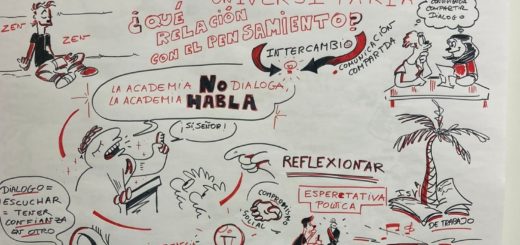For a scientific activity at the service of the common good and social commitment
1.- A NEW GOVERNANCE OF SCIENTIFIC RESEARCH
Academic capitalism and business managerialismThe classical model of liberal science (Krimsky, 2003) is based on the principles of universal activity (beyond particular cultures), public good (as results of shared work) and disinterested activity (oriented to the search for truth and common good). The current hegemonic academic capitalism is displacing these principles, subordinating them to commercial logic. Increasingly, researchers, departments and universities are linking research results to direct economic interest, among other reasons, due to the sponsorship of their work by private companies (Aguillo, 2014; Díez Gutiérrez, 2018). Knowledge no more is conceived as a public good to become a good of private exploitation and appropriation whose value is determined in the market.
This implies a demand for an increase in research production, within the framework of permanent competitiveness (Rodríguez Victoriano, 2017). The supposed Productivity / quality relationship bring under scientific research to succesive regulations, classifications and rankings that turn knowledge into capital. From this logic, market value is measured by external indicators that quantify it and display it (Laval & Dardot, 2013; Gómez, Bravo & Jódar, 2015): number of patents, articles published in journals indexed in the JCR, recognized research periods (six-year terms), R&D projects, doctoral theses, FPU scholarships, doctorates with a mention of excellence, etc.
From this logic, scientific knowledge is substantially transformed through these accounting operations, which quantify intellectual work (Barot, 2013). In this way they are capable of being incorporated into the buying and selling system of the academic capitalist circuits. Academic capitalism then becomes a colonial matrix of “epistemic extractivism” (Rivera Cusicanqui, 2010). Knowledge converted into a merchandise-form and its subordination to the productivist logics of the knowledge economy are ways of redefining the knowledge produced, the technologies developed, etc. According to Grofoguel (2016), these productions are transformed into economic capital or into mechanisms for obtaining symbolic capital gains in the modern / colonial capitalist / patriarchal Euro / Euro-American world-system
Entrepreneurship as a plus of intellectual enjoymentThese processes are also part of a neoliberal governance strategy typical of post-disciplinary control societies (Deleuze, 1999). A new Ethos arises based on moral codes that legitimize a practical projection in the form of a new active social statute (Zangaro, 2011). An ideal of responsible autonomy is emphasized through concepts such as excellence, entrepreneurship, innovation, self-actualization, or creativity. In this way, it is generated the image that each subject is the bearer of human capital that must bear fruit, from individual logics in a context of growing competition. Thus, the imaginary of the intellectual-entrepreneur is consolidated, in accordance with the neoliberal logic. So, the researcher turns an active subject on the lookout for the best opportunities in the knowledge market, in his own interest. This changes the rules of the game on the ways of accessing economic resources, symbolic goods, the ability to influence, etc. An individualistic identity is established focused on the struggle for access to resources, regardless of scientific or ideological models to which to enroll. This represents the success of a self-serving and utilitarian culture.
The intellectual exercise is subjected to a kind of superego mandate that forces a permanent experimentation of breaking boundaries, of awareness of the search for the limitless. This is what we will call the intellectual enjoyment plus. The figure of the entrepreneurial intellectual is, precisely, a process of self-exploitation through the experimentation of the equation unlimited performance-enjoyment (Alemán, 2016). Another complementary mechanism also intervenes in this dynamic: the relationship the researcher maintains with the “creditor of the debt” (Lazzarato, 2013). That is, a feeling of guilt is generated in the researcher due to his difficulty in achieving the required excellence, which becomes him/her a debtor of something that is impossible to satisfy.
There are, therefore, several ways of subjecting the subject of neoliberal science: as an entrepreneur of itself, as a debtor, or both at the same time. Scientific activity becomes a permanent crossroads (Castillo and Moré, 2018). We can speak of a heteronomous work ethic based on self-regulation, personal responsibility, participation, innovative dynamism and insertion in nearby communities. Failure to comply with these ethics is to endanger one’s own scientific and professional career.
2- ON NEED TO OPEN THE SCIENTIFIC FIELD
The previous analysis leads us to propose the need to open the world of science and research, especially from two different perspectives: the pro-common, and the gender perspective. Both constitute the axes for a change in policy and academic and scientific practice.
Epistemic plurality and expanded science. Redefine the knowledge agenda from the pro-commonWe begin by recognizing the richness of the contemporary epistemological field that supposes a variety of options in the production, circulation and reception of knowledge (Agnew, 2006). Democracy is updated every time a community becomes visible (Marres, 2005) and takes the floor, shaping a vision of the world. Thus, they become epistemic communities. In this way, the possibility of thinking and acting outside the dominant frames of thought opens up. This necessarily implies more participation since the border between politics and science becomes more porous and changes the rules of the game.
In this new scenario, the research progress towards the ecosystem of hybrids (Jasanoff, 2004), and of vernacular modernities (Hall, 2000) or alternatives (Escobar, 2010). Local groups translate, divert and reconstruct the imperatives of hegemonic technoscience. New ways of doing are emerging in the form of ecologies of knowledge, inclusive dialogic strategies, local life networks, etc. We can therefore speak of an ethic linked to autonomy and hedonic well-being (Riechmann, 2008; Pakman, 2011). This leads us to the question of pro-commons and the urgency of opening the sciences to the basic needs of our time, material and immaterial, and the research problems that they open up. Thus, we move towards an object of study related to the central questions of our hypercomplex societies as bio-psycho-socio-eco-cultural systems (Villasante, 2006, 2014):
Interactions with the ecosystem (Habitat / Inhabitat): the exploitation of nature, the depletion and waste of biodiversity, the technologies used in the framework of extractive-productivist models, the sustainability of local and general ecosystems
Interactions related to interpersonal bond and social reproduction (Empower): issues related to power and domination appear, but also to solidarity, care and management of powers and emotions in everyday life, patriarchy as a social structure, the consequences of cultural and ethical norms with which to develop as a society, the recovery of demo-diversity.
Interactions with the production and possession of goods and services, objects and merchandise (Having / Working): It leads us to question the production and accumulation of surpluses as a factor and indicator of progress, the fetishism of merchandise and labor exploitation, the question of consumerism and growing and exponential spending, the problem of financial and speculative capitalism
The interactions with the messages and the contents of the beliefs that circulate in each culture (Believe / Create): the “dominant value equivalents” on a world scale that seek to generate the perception of a “natural” and hierarchical order, the role they the mass-media play in the ideological reproduction and hegemony of dominant values, the acceleration of the forms of communication and information caused by new technologies, the relationship of science with traditional knowledge, religious imposition.
Moving towards research with a gender and / or feminist perspectiveIf there is a field in which science has yet to initiate a process of reconfiguration and opening, it is that related to gender and women. In recent years we have witnessed a proliferation of gender studies, both at the international and national levels. However, and unfortunately, in many of them there is a clear tendency to consider gender and women only as an object of study.
It is still strange to find research that assumes the feminist perspective, or even gender, as a premise (Biglia, 2015). Although the partial inclusion of feminist theoretical proposals in academic debates is being favored, this is also being used to discredit proposals that call for changes in the ways of producing knowledge (Biglia and Jiménez, 2012; Mendía Azkue et al., 2015). Therefore, a reflection on the inclusion of the gender and / or feminist perspective in our research is necessary that questions the heteropatriarchal forms of scientific work and the associated academic cultures. (Blázquez Graff et al., 2012).
We must generate questions in relation to the different phases and aspects of the research process that allow us to reflect on the working groups, the design, the contents and the methodological and processual choices (UE, 2011), at least in relation to four problems:
Firstly, the reflection on whether we have sufficiently considered gender equality in our research teams, also thinking about working conditions, the possible power relations that are established, the decision-making processes that they entail, as well as on the importance of these elements or not in the research group (Folch, 2015).
Secondly, to ask ourselves questions related to the research design phase that challenge us about the incorporation of the gender or feminist perspective when establishing the research topic, objectives, questions and hypotheses, as well as whether gender impacts have been foreseen from the beginning (Martín & Muñoz, 2014).
Thirdly, questions about the implementation phase of the research, which allows us to ask to what extent the gender or feminist perspective has been considered in the generation of data and its analysis, in relation to the groups involved, the value and visibility of the work carried out by each of the participants and whether there has been sufficient monitoring of this issue throughout the process (Caprile, 2012).
Finally, we invite you to reflect on the results, impacts and their dissemination. Thus, we seek to rethink how we have expressed the results in the presentations, narratives and forms of dissemination, whether we have sufficiently made visible the contributions of women and gender specificities and whether we have considered the times and spaces of dissemination, as well as the different possible channels for that the knowledge generated was disseminated in a non-androcentric way and reaches society as a whole (Díaz & Dema, 2013).
References
Agnew, John. (2006). Geografías del conocimiento en la política mundial. Tabula Rasa, 4, 49-58.
Aguillo, Isidro F. (2014). Políticas de información y publicación científica. El profesional de la información, marzo-abril, v. 23, n. 2: 113-118.
Alemán, Jorge. (2016). Horizontes neoliberales de la subjetividad. Buenos Aires: Grama Ediciones.
Barot, Emmanuel. (2013). ¿La mercantilización del saber nació con el neoliberalismo? La Izquierda Diario. Disponible en: http://www.laizquierdadiario.com/ideasdeizquierda/wp-content/uploads/2013/12/27-29-Barot.pdf.
Biglia, Bárbara. (2012). Corporeizando la epistemología feminista: investigación activista feminista. En F. Liévano, M. y M. Durque Mora (Eds.), Subjetivación femenina: investigación, estrategias y dispositivos críticos (pp. 195-212). Nuevo León: Universidad Autónoma de Nuevo León.
Biglia, Bárbara. (2015). Avances, dilemas y retos de las epistemologías feministas en la investigación social. En I. Mendia et al . (Eds.), Otras formas de (re)conocer (pp. 21-44). Bilbao: UPV.
Biglia, Bárbara., y Jiménez, Edurne. (2012). Conformidades y disconformidades en habitar los márgenes en la investigación social. En Y. Onghena y A. Vianello (Eds.), Políticas del conocimiento y dinámicas interculturales. Acciones, innovaciones, transformaciones (pp. 103-115). Universidad de Naciones Unidas.
Blazquez Graf, Norma; Flores Palacios, Fátima y Ríos Everardo, Maribel (Coords.) (2012). Investigación feminista: epistemología, metodología y representaciones sociales. México DF: UNAM.
Caprile, Maria (coord.) (2012). Guía práctica para la inclusión de la perspectiva de género en los contenidos de investigación. Fundación CIREM http://www.idi.mineco.gob.es/stfls/MICINN/Ministerio/FICHEROS/UMYC/Guia_practica_ge nero_en_las_investigaciones.pdf.
Castel, Robert. (1998). Del postliberalismo al neoliberalismo. Fernando Álvarez-Uría (Comp.). Neoliberalismo versus democracia (pp. 404-416). Madrid: Endymion/La Piqueta.
Castillo, Juan José., & Moré, Paloma. (2018). Universidad precaria, universidad sin futuro. Madrid: Fuhem Editorial.
Deleuze, Gilles. (1999). Posdata sobre las sociedades de control. Christian Ferrer (Comp.). El lenguaje libertario. Antología del pensamiento anarquista contemporáneo (pp. 114-121). Buenos Aires: Altamira.
Díaz Martínez, Capitolina; Dema Moreno, Sandra (2013). Metodología no sexista en la investigación y producción del conocimiento. Capitolina Díaz Martínez., Sandra Dema Moreno (Coord.). Sociología y género (pp. 65-86). Madrid: Tecnos.
Díez Gutiérrez, Enrique Javier. (2018). Universidad e investigación para el bien común: la función social de la Universidad. Aula abierta, 47(4), 395-402.
Escobar, Arturo. (2010). Territorios de diferencia. Lugar, movimiento, vida, redes. Popapán: Envion Editores.
European Gender Summit (2011). Manifest for integrated action on the gender dimension in research and innovation. Recuperado de: http://www.wings.lu.se/sites/www.wings.lu.se/files/egs_manifesto_2011.pdf.
Gómez, Lucía, Bravo, María Jesús., & Jódar, Francisco. (2015). Gubernamentalidad neoliberal y producción de conocimiento en la universidad: genealogía de una configuración subjetiva. Universitas Psychologica, 14(5), 1735-1750. http://dx.doi.org10.11144/Javeriana.upsy14-5.gnpc.
Grosfoguel, Ramón. (2016). Del ‹‹extractivismo económico›› al ‹‹extractivismo epistémico›› y al ‹‹extractivismo ontológico››: una forma destructiva de conocer, ser y estar en el mundo. Tabula Rasa, 24, 123-143
Hall, Stuart. (2000). La cuestión multicultural. Stuart Hall., Restrepo, Eduardo., Catherine Walsh & Víctor Vich (Eds.). Pensamiento sin garantías: trayectorias y problemáticas en estudios culturales (pp. 257-286). Bogotá-Lima-Quito: Envión Editores-IEP-Instituto Pensar-Universidad Andina Simón Bolívar.
Harvey, D. (2014). Guía de El Capital de Marx. Libro primero. Madrid: Akal.
Jasanoff, Sheila. (2004). Ordering Knowledge, Ordering Society. Sheila. Jasanoff, (Ed.). States of Knowledge. The Co-production of Science an Social Order (pp.13-45). London, Routledge.
Krimsky, Sheldon. (2003). Science and the Private Interest. Has the Lure Of Profits Corrupted Biomedical Research? Landham: Rowman & Littlefield Publisher, Inc.
Laval, Christian., & Dardot, Pierre. (2013). La nueva razón del mundo.Ensayo sobre la sociedad neoliberal. Barcelona:Gedisa.
Lazzarato, Maurizio. (2013). La fábrica del hombre endeudado. Ensayo sobre la condición neoliberal. Madrid: Amorrortu.
Marres, Noortje. (2005). ‹‹No Issue, No Public: Democratic Deficits after the Displacement of Politics››. PhD dissertation, University of Amsterdam. Disponible en: http://dare.uva.nl/document/17061.
Martín Palomo, María Teresa; Muñoz Terrón José María. (2014). Epistemología, metodología y métodos. ¿Qué herramientas para qué feminismo? Reflexiones a partir del estudio del cuidado. Quaderns de Psicologia, 16(1): 35-45. http://www.quadernsdepsicologia.cat/article/view/1213.
Mendía Azkue, Irantzu; Luxán, Marta; Legarreta, Matxalen; Guzmán, Gloria; Zirion, Iker Azpiazu Carballo, Jokin (EDS.). Otras formas de (re)conocer. Reflexiones, herramientas y aplicaciones desde la investigación feminista. Gipuzkoa: Hegoa/UPV-EHU
Pakman, Marcelo. (2011). Palabras que permanecen, palabras por venir. Micropolítica y poética en psicoterapia. Barcelona: Gedisa.
Riechmann, Jorge. (Coord.) (2008). ¿En qué estamos fallando? Cambio social para ecologizar el mundo. Barcelona: Icaria.
Rivera Cusicanqui, Silvia. (2010). Ch’ixinakax utxiwa : una reflexión sobre prácticas y discursos descolonizadores. Buenos Aires: Tinta de Limón.
Rodríguez Victoriano, José Manuel. (2017). La praxis de la excelencia universitaria entre la paranoia de sus promotores y la culpa de sus víctimas: hacia la recuperación del deseo docente y la universidad pública. Teknokultura. 14 (1), 85-103.
Tomàs-Folch, Marina. (Coord.); Dolors Bernabeu, María.; Castro, Diego.; Duran-Bellonch, Mar.; Ion, Georgeta., y Mentado, Trinidad. (2015). La investigación académica en ciencias sociales desde una perspectiva de género. Barcelona: Octaedro.
UE (2011). Toolkit Gender in EU-funded research. Luxembourg: Publications Office of the European Union, 2011
Villasante, Tomás R. (2006). Desbordes creativos. Estilos y estrategias para la transformación social. Madrid: Los Libros de la Catarata.
Villasante, Tomás R. (2014). Redes de vida desbordantes. Fundamentos para el cambio desde la vida cotidiana. Madrid: Los Libros de la Catarata.
Zangaro, Marcela. (2011). Subjetividad y trabajo: el management como dispositivo de gobierno. Trabajo y Sociedad,15(16), 163-177

Authors
Eduardo Fernández Rodríguez *
José Ignacio Rivas Flores *
Jesús Valverde Berrocoso
* Miembros al colectivo UNIDIGNA







